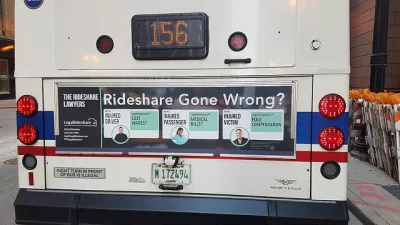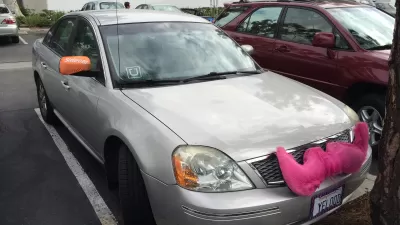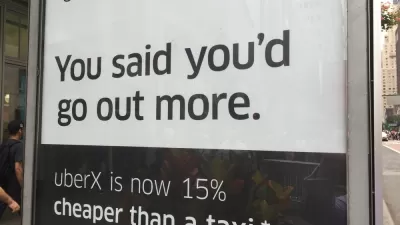A new study predicts the congestion relief benefits of carpooling services offered by Transportation Network Companies. A skeptical audience replies.

"For years, Uber and Lyft have been promising to save the world from traffic jams," reports Marisa Kendall. "A new study suggests they might actually do it."
MIT's Computer Science and Artificial Intelligence Laboratory produced the study, finding that the carpool services transportation network companies make available "could reduce the number of vehicles on the road by 75 percent."
The key is that users actually chose to take shared rides. The shared ride option has gained some traction already, writes Kendall: "In cities where UberPool is available, Uber customers choose the carpool option for 20 percent of trips, according to the ride-hailing company."
The study responds to past studies in San Francisco and New York that make the opposite claim. In New York, the Department of Transportation proposed a cap of the number of TNC vehicles operating in the city, with congestion data backing the proposal. In San Francisco, the Municipal Transportation Agency asked for an environmental review of TNC operations.
Joe Cortright was compelled to write an article casting doubt on the blue-sky scenario described by the MIT study. Cortright calls out several fallacies that contribute to what he calls "uncritical techno-optimism" regarding transportation technology advancements: the fixed demand fallacy, the big data fallacy, and the mathematical model fallacy.
FULL STORY: Study: Uber, Lyft carpool services could reduce traffic by 75 percent

Alabama: Trump Terminates Settlements for Black Communities Harmed By Raw Sewage
Trump deemed the landmark civil rights agreement “illegal DEI and environmental justice policy.”

Study: Maui’s Plan to Convert Vacation Rentals to Long-Term Housing Could Cause Nearly $1 Billion Economic Loss
The plan would reduce visitor accommodation by 25% resulting in 1,900 jobs lost.

Planetizen Federal Action Tracker
A weekly monitor of how Trump’s orders and actions are impacting planners and planning in America.

Wind Energy on the Rise Despite Federal Policy Reversal
The Trump administration is revoking federal support for renewable energy, but demand for new projects continues unabated.

Passengers Flock to Caltrain After Electrification
The new electric trains are running faster and more reliably, leading to strong ridership growth on the Bay Area rail system.

Texas Churches Rally Behind ‘Yes in God’s Back Yard’ Legislation
Religious leaders want the state to reduce zoning regulations to streamline leasing church-owned land to housing developers.
Urban Design for Planners 1: Software Tools
This six-course series explores essential urban design concepts using open source software and equips planners with the tools they need to participate fully in the urban design process.
Planning for Universal Design
Learn the tools for implementing Universal Design in planning regulations.
Caltrans
Smith Gee Studio
Institute for Housing and Urban Development Studies (IHS)
City of Grandview
Harvard GSD Executive Education
Toledo-Lucas County Plan Commissions
Salt Lake City
NYU Wagner Graduate School of Public Service





























